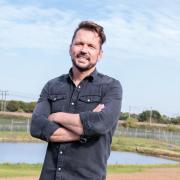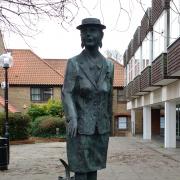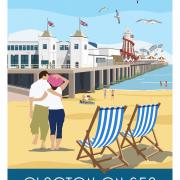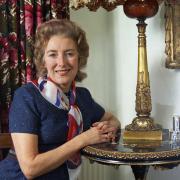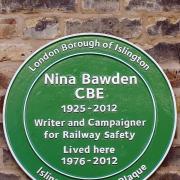Rachael Perrett meets five inspiring people who challenge negative Essex stereotypes while proudly giving back to their community

Dave Monk
BBC Essex broadcaster
From studying law to running a wine bar and bistro, Dave Monk’s list of accomplishments is certainly impressive. But where many would use their success to climb corporate ladders, this Southend native has used his talents to help others.
Dave has been a broadcaster with BBC Essex since the station first came on air in 1986, and after all these years, he knows he’s right where he should be. ‘I came into radio when I was in my 30s; I’d had other careers before, so I never regarded it as a career and it certainly wasn’t for the money,’ Dave tells us. ‘With local broadcasting, you are steeped in your community. You know your audience and what they care about.’
While the thrill of interviewing celebrities excited Dave in his early career, he soon realised it was the everyday listeners who really had something interesting to say. ‘Everyone has a life story to tell, even though most think no one will be interested – I am. Just think of what’s happened over the pandemic: so-called ordinary people have done the most extraordinary things to help others in their communities. It’s why BBC Essex invited people to celebrate these extraordinary people through the BBC Essex Make a Difference Awards.’
But Dave doesn’t just connect with the community from behind the mic, he also takes advantage of his public role by using it as a platform for good. Besides being a Deputy Lieutenant for Essex and Vice Chair of Trustees for the children’s mental health charity Kids Inspire, he’s passionate about encouraging people to take care of themselves as well as others.
‘I get much greater pleasure from working with charities than I ever did making money,’ Dave says. ‘I’ve done a lot of work on men’s health, and I have been working for 30 years or so on mental health issues. When I started talking about mental health on the radio it was a taboo subject. I'm pleased that that has finally changed, but there’s still a long way to go.’
‘I’ve also launched a new weekly feature on my programme, highlighting the importance of volunteering. After Covid, I think a lot of people are looking for something positive to do, and if we can help introduce them to a charity that would benefit from their skills, life experience and time, then everyone wins.’
Find out more about the Make a Difference Awards at bbc.co.uk/makeadifference

Anne Wafula Strike MBE
British Paralympian wheelchair racer
After contracting polio at two years old, Anne Wafula Strike could have been abandoned. Instead, she went on to become a Paralympian wheelchair racer and motivational speaker.
In her native Kenya, disabilities were often seen as a curse. But despite being ostracised from their community, Anne’s parents fiercely protected the young girl after she lost the use of her legs. Years later, after moving to the UK with her husband and giving birth to her son, Anne found herself on a different path that gave her a new lease of life.
‘After I had my son, I wanted to lose weight,’ Anne tells us. ‘I also felt that my self-esteem really got a bashing after I moved here, as I was trying to assimilate to a different culture. Then I found wheelchair racing. I started to use the gym and socialise with other people with disabilities – that opened a new world to me.’
In 2004, Anne became the first wheelchair racer from sub-Saharan Africa to compete at the Paralympics, flying the flag for Kenya. In 2006, she then joined Team GB. But for this Essex-based athlete, donning a tracksuit takes on an entirely new meaning.

‘To be introduced to wheelchair racing then signing up to my first Paralympics, it was a blessing. Here I was flying the flag of people who had ostracised us; here I was saying that disability is not just losing the use of limbs. When you are disabled, it shouldn’t mean that you are now available for exclusion or discrimination.’
The resilience Anne developed on the track has carried over into her charitable work today. Anne works with Active Essex, Princess Alexandra Hospital, Essex-based children’s charity The Dream Factory and Able Child Africa. Through all of her campaigning, her message remains the same: it’s not the disability that defines a person, it’s the challenges that society puts in their path.
‘Disability is not something that an individual just overcomes,’ Anne says. ‘What we’re asking for is not what is easy but what is possible. That might be having a lift that works or having accessible toilets that aren’t being used as storage. I think society can put assistance and policies in place that can enable disabled people to continue being very productive members of society.’
To buy Anne’s autobiography or stay up to date with news of her second book, visit annestrike.org

Demetra Lindsay
Chatelaine of Hedingham Castle
Living in a castle is what dreams are made of. But caring for a nearly 900-year-old piece of history is no mean feat (especially when you throw in public tours, weddings, corporate events, school visits and accommodation!). For Demetra Lindsay, chatelaine of Hedingham Castle in north Essex, it’s a full-time job that requires patience and resilience.
Since moving to Hedingham nearly 18 years ago, Demetra and her husband, Jason, have made remarkable changes to the property, sympathetically restoring the keep and house, which they now share with their three children.
‘At the beginning, I found living here rather overwhelming,’ Demetra recalls. ‘But very soon, with the encouragement of the wonderful team who help us look after Hedingham, I found it easier. It is still an awesome task, but we find the place so fascinating, which is a much-appreciated return favour.’
Naturally, such an old building requires a lot of maintenance. Demetra and her team work in close consultation with Historic England and have received vital grants from the Historic Houses Foundation. But aside from ensuring the building itself meets strict standards, the team is also responsible for telling the correct history of the castle.

It may seem like an overwhelming task, but for this former London-based architect who’s passionate about education, it’s a match made in heaven. Now, Demetra hopes to pass on her enthusiasm to future generations. ‘I am so lucky that I not only love old buildings, but that I understand them as well. But needless to say, I am on an incredible learning curve all the time. The house was in very bad shape when we arrived and needed (and still needs) a lot of tender loving care. I am so lucky that I live in my own project – it is what architects dream of.
‘My last project was The Westminster Academy, a secondary school in London. That project really ignited my passion for education. Now, we are striving for a really good educational offer here. Hedingham can teach us so much about everything that life has to offer, from the history of the people who built it, to the maths and technology that they used. I hope that all our hard work in this generation will be a stepping stone to creating a legacy that champions all of these avenues.’
To find out more about Hedingham Castle, visit hedinghamcastle.co.uk

Nabila Tejpar
Rally driver
As a third-generation rally driver, you could say that motorsport runs in Nabila’s blood. Since she was little, Nabila dreamt of being a racing driver, her passion fueled by visits to Goodwood with her father. After getting her first rally car aged 15, Nabila hasn’t looked back, competing in various championships across the UK and abroad.
Despite the ups and downs of the sport, Nabila has found plenty of positives that have driven her to succeed on and off track. ‘I have learnt so much within motorsport that has certainly carried over into daily life,’ she says. ‘Resilience and learning how to deal with setbacks, the fact that failure is the key to success, and how to navigate a world you don’t know enough about. There has certainly been sadness and frustration at times, but it’s also given me a lot of strength.
‘The support of my family has also helped me to follow my dreams of becoming a driver. They’ve taught me the importance of working hard to achieve what you want no matter what it is. It hasn’t been easy, but I know without that support I wouldn’t be where I am today.’

Hoping to share her passion for racing with other young women while inspiring them to give it a try, Nabila regularly advocates for inclusion and diversity in motorsport. ‘I have been incredibly lucky to have had a good experience of the sport; it is just one that needs to have more females willing and able to step into it.
‘Motorsport is extremely expensive, and it’s difficult to break into if you do not come from a motorsport background. But it’s the only level sport where you can compete in exactly the same car and conditions. It is very important that we continue to help open doors to make motorsport fully equal. One of my big aspirations is to work at grassroots level and show that motorsport is a viable sport to enter, not only for young girls, but also for ethnic minorities and other individuals where they see no access. I think these are key areas that we can all be working together to change so we can see the sport thrive and progress for many years to come.’
Follow @nabila.tejpar on Instagram to stay up to date with Nabila’s races and other news.

Adrian Gayler
Metal detectorist
You’d be forgiven for assuming that metal detectorists are gold diggers. But for someone like Adrian, it’s a way of immersing yourself in Essex’s rich history, while being part of wider efforts to improve people’s wellbeing.
Based in Chelmsford, Adrian has been metal detecting since childhood, but rekindled his passion after a major health scare six years ago. Today, he detects across Essex and the UK, supports metal-detecting fundraisers, writes for Treasure Hunting magazine, and is soon to be a member of the National Council for Metal Detecting. Suffice to say, Adrian takes his hobby very seriously.
‘I don’t come across as the normal detectorist – dresses in camo, smokes 20 cigarettes a day, is normally a plumber and doesn’t really use technology to its full ability. I have apps on my phone, do map research and have a proper proposal to meet land owners.’

While he has thousands of artefacts stored away at home, others have been sent off to be valued. Having found various pieces of significant interest – from a medieval 24k bishop’s ring to bullets from the Zulu War – Adrian is still humbled by his findings as well as the spots he unearths them in.
‘When you’re in the field on your own, in nature, and it’s dead silent, then you unearth something – it could be a bullet from WWII or a child’s purse from the 1930s – you do get a feeling of “I was the last person to touch this”. When was it lost? Why was it lost?
‘We have a huge amount of Roman and Celtic history in Essex. So, for me to go along, put my metal detector in the ground and pull out a coin that’s 2,000 years old knowing I’m the first person to touch it in so long, that’s just… Wow.’

Over the years, Adrian has seen big changes in the hobby, from the demographics of metal detectorists to the type of technology used. But perhaps the biggest shift he hopes to see is in the way metal detecting is portrayed.
‘This hobby does a lot of good behind the scenes, but you don’t hear about the charity work or how metal detecting is being used with Help for Heroes to support soldiers with PTSD, for example.’
Having witnessed the mental and physical health benefits first hand, this metal detectorist is keen to help champion the hobby’s ability to be a force for good.
Follow @field_tester_thm to keep up with Adrian’s finds.
Head to visitessex.com/explore/this-is-essex to find more fascinating people who are putting Essex on the map.
You might also like Essex's secret celebrity island: https://www.greatbritishlife.co.uk/lifestyle/osea-island-essex-celebrity-hangout-8986912




